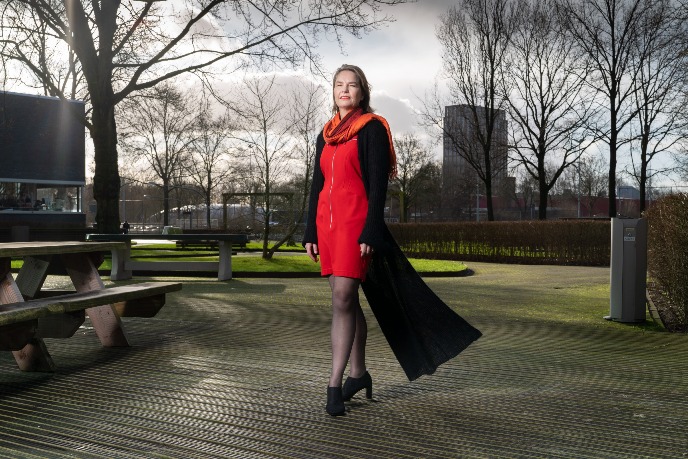New in Groningen: Ulrike Schultze
| Date: | 11 May 2023 |

Ulrike Schultze recently joined the Faculty of Economics and Business as Professor of Business Information Systems. Before coming to Groningen, Schultze worked at the Southern Methodist University in Dallas for 25 years. She decided to make the move to be closer to family again, but also expected to feel at home in Groningen’s academic environment. She likes her new department Innovation Management and Strategy, for its interdisciplinary approach to research. This interdisciplinary approach is key when focusing on the application of information technology and its implications for work and social life, as Schultze does.
Why did you choose Groningen?
“For family reasons, I wanted to move to Europe after having lived in the US for a long time. Groningen came on my radar because it is within three hours’ drive from my mother, sister and some of my extended family in Germany. However, the more I learned about FEB and the Innovation Management and Strategy (IM&S) department, the more convinced I became that the University of Groningen was where I wanted to be. It has many characteristics to which I am accustomed from the US academic system: FEB is structured along departmental lines, the Information Systems group is part of an interdisciplinary department and the faculty leadership can make decisions quite quickly and independently from the university.”
Could you tell us about your career so far?
“I moved from South-Africa, where I grew up, to the United States, where I accepted a PhD position at Case Western Reserve University. I was really lucky to have a dissertation advisor there who was rather idealistic in his approach to research. He always said “let’s create new knowledge!”, rather than “let’s create something publishable.” He was therefore encouraging when I wanted to do ethnographic research for my dissertation. This was quite unusual in US business schools at the time, as the field of information systems was reluctant to publish qualitative work. After obtaining my PhD, I took a position at Southern Methodist University, in Dallas, Texas, where I stayed for 25 years until my move to the University of Groningen.”

Your Chair is in Business Information Systems. What issues are dealt with in your research?
“Traditionally, Information Systems (IS) research has primarily concerned itself with the application of Information Technology (IT) to improve organizational performance. However, the boundaries between home and work life are increasingly blurring. As a result, the IS field’s disciplinary boundaries are expanding to include organizing from the individual through to the social level. I focus on the use of information technology in practice to understand its implications for work and social life. As I approach each research project by asking “what is most salient about the technology under study?”, my research cannot be described as phenomenon-driven. Instead, the phenomenon of interest emerges out of the empirical context. For example, my dissertation work on the implementation of a knowledge management technology, led me to questions of knowledge work: what it means, how professions seek to differentiate themselves to be perceived as value adding, et cetera. In contrast, my research on social media, including virtual worlds, has led me to study identity work. Letting the situated use of a given technology guide me to the relevant research questions means that I have explored a wide variety of social phenomena including organizing, dialectics, standardization, solidarity and self-identity. Nevertheless, broadly speaking, my work deals with digital platforms. I have studied the use of various types of platforms, encompassing proprietary and shared platforms, B2B and sharing economy marketplaces, as well as social media platforms used in activism and gaming.”
What is the societal relevance of your research?
“Understanding what kind of world and reality we are producing with the technologies we deploy as a society, I believe, is really important if technology implementation decisions are to be made wisely, that is, in ways that do more good than harm and that maintain human dignity. Insights into the complex relationship between technology and social phenomena and its implications seem more important than ever, given that we are now at a place where technologies like big data analytics and artificial intelligence are less reflective but instead more productive of reality and use data and logics that are no longer traceable by humans. In my work, I strive to develop theory by finding and explaining recurrent patterns in the messy reality of everyday life with technology. With frameworks and theories, the complex flow of events can be simplified and described in key concepts and relationships. Once abstracted into conceptualizations, the messiness of organizational and social life can be managed more readily, by researchers, practitioners and policy makers.”
What can we expect from you in the future?
“I expect to engage in collaborative projects with my colleagues in IM&S, FEB and other faculties. I anticipate that such collaboration will lead me to explore many different phenomena, although always with an eye to the implications of technology on individuals, organizations and society.”
Key publications
Lindgren, R., L. Mathiassen & U. Schultze. 2021. “The Dialectics of Technology Standardization,” MIS Quarterly, 45(3), 1187-1212.
Hylving, L. & U. Schultze. 2020. “Accomplishing the Layered Modular Architecture in Digital Innovation: The Case of the car’s driver information module,” Journal of Strategic Information Systems, 29(3), 101621.
Schultze, U. & J.M. Brooks. 2019. “An interactional view of Social Presence: Making the virtual other “real”,” Information Systems Journal, 29 (3), 707-737.

